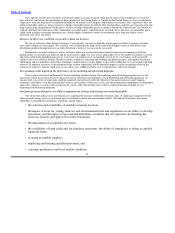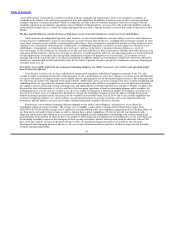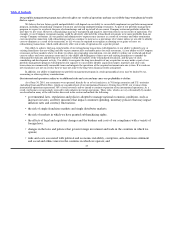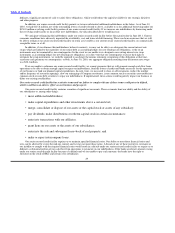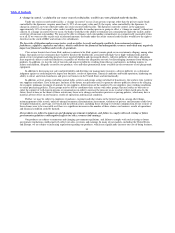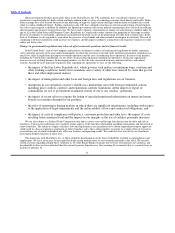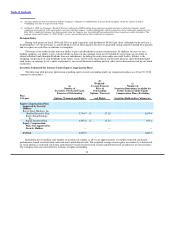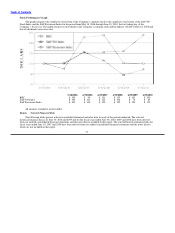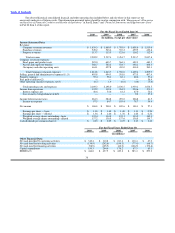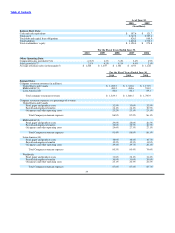Burger King 2010 Annual Report Download - page 34
Download and view the complete annual report
Please find page 34 of the 2010 Burger King annual report below. You can navigate through the pages in the report by either clicking on the pages listed below, or by using the keyword search tool below to find specific information within the annual report.
Table of Contents
addition, future mandated modifications to our facilities to make different accommodations for disabled persons and modifications
required under the ADA could result in material unanticipated expense to us and our franchisees.
If we fail to comply with existing or future laws and regulations, we may be subject to governmental or judicial fines or sanctions.
In addition, our and our franchisees’ capital expenditures could increase due to remediation measures that may be required if we are
found to be noncompliant with any of these laws or regulations.
We are subject to risks related to the provision of employee health care benefits.
We use a combination of insurance and self−insurance for workers’ compensation coverage and health care plans. We record
expenses under those plans based on estimates of the costs of expected claims, administrative costs, stop−loss insurance premiums and
expected health care trends. These estimates are then adjusted each year to reflect actual costs incurred. Actual costs under these plans
are subject to variability that is dependent upon participant enrollment, demographics, and the actual costs of claims made. In the event
our cost estimates differ from actual costs, we could incur additional unplanned health care costs, which could adversely impact our
financial condition.
In March 2010, comprehensive health care reform legislation under the Patient Protection and Affordable Care Act (HR 3590) and
Health Care Education and Affordability Reconciliation Act (HR 4872) (collectively, the “Acts”) was passed and signed into law.
Among other things, the health reform legislation includes guaranteed coverage requirements, eliminates pre−existing condition
exclusions and annual and lifetime maximum limits, restricts the extent to which policies can be rescinded, and imposes new and
significant taxes on health insurers and health care benefits. Provisions of the health care reform legislation become effective at various
dates over the next several years. The Department of Health and Human Services, the National Association of Insurance
Commissioners, the Department of Labor and the Treasury Department have yet to issue necessary enabling regulations and guidance
with respect to the health care reform legislation.
Due to the breadth and complexity of the health reform legislation, the lack of implementing regulations and interpretive guidance,
and the phased−in nature of the implementation, it is difficult to predict the overall impact of the health reform legislation on our
business and the businesses of our U.S. franchisees over the coming years. Possible adverse effects of the health reform legislation
include reduced revenues, increased costs, exposure to expanded liability and requirements for us to revise the ways in which we
conduct business or risk of loss of business. In addition, our results of operations, financial position and cash flows could be materially
adversely affected. Our U.S. franchisees face the potential of similar adverse effects, and many of them are small business owners who
may have significant difficulty absorbing the increased costs.
The personal information that we collect may be vulnerable to breach, theft or loss that could adversely affect our reputation, results
of operation and financial condition.
In the ordinary course of our business, we collect, process, transmit and retain personal information regarding our employees and
their families, franchisees, vendors and consumers, including social security numbers, banking and tax ID information, health care
information and credit card information. Some of this personal information is held and managed by certain of our vendors. Although we
use security and business controls to limit access and use of personal information, a third party may be able to circumvent those security
and business controls, which could result in a breach of employee, consumer or franchisee privacy. A major breach, theft or loss of
personal information regarding our employees and their families, our franchisees, vendors or consumers that is held by us or our
vendors could result in substantial fines, penalties and potential litigation against us which could negatively impact our results of
operations and financial condition. Furthermore, as a result of legislative and regulatory rules, we may be required to notify the owners
of the personal information of any data breaches, which could harm our reputation and financial results, as well as subject us to
litigation or actions by regulatory authorities.
Information technology system failures or interruptions or breaches of our network security may interrupt our operations, subject
us to increased operating costs and expose us to litigation.
We rely heavily on our computer systems and network infrastructure across our operations including, but not limited to,
point−of−sale processing at our restaurants. Despite our implementation of security measures, all of our
32


